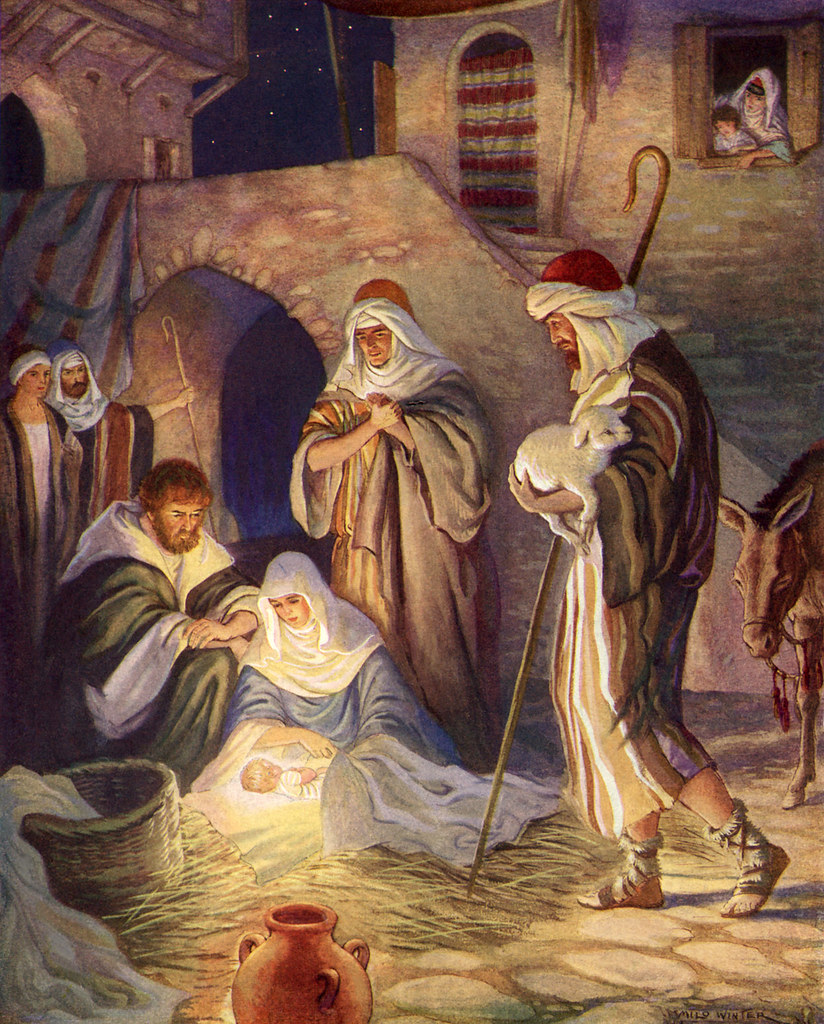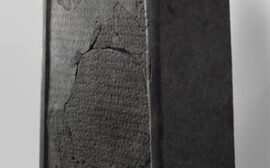By: Daniel Sloan, Ph.D. | December 3, 2023
As we approach the Christmas Season, it is natural for us to begin reading the Christmas story. We hear it in things like Charlie Brown’s Christmas or a Hallmark Movie. However, what we may not realize is how many prophetic events were fulfilled in this one short story. The Book of Matthew, which was written to a predominantly Jewish audience that was familiar with the Old Testament, described four key prophecies that were fulfilled during events leading up to and directly after the birth of Jesus.[1]
His Birth Was Foretold in Isaiah 7:14
First, after Gabriel came to Mary and told her that she would become pregnant with Jesus, Matthew stated in 1:22-23, “So all this was done that it might be fulfilled which was spoken by the Lord through the prophet, saying: “Behold, the virgin shall be with child, and bear a Son, and they shall call His name Immanuel,” which is translated, “God with us.” This quotation comes from Isaiah 7:14 during the reign of King Ahaz. Ahaz was under invasion from both Israel and Syria and instead of trusting God, attempted to make a deal with Assyria. Isaiah then came to Ahaz and gave him this prophecy, showing that the Davidic line would continue into the future. While this prophecy was given 700 years before the birth of Christ, Matthew makes it clear that it was a prophecy about the virgin birth of Jesus.[2]
His Birth Was Foretold in Micah 5:2
A second prophecy was fulfilled in Matthew with the coming of the wise men from the East. They came to King Herod in search of the new king, causing Herod to ask his own religious advisors where the prophesied Messiah would be born. They came back to Herod in 2:5-6 and stated, “In Bethlehem of Judea, for thus it is written by the prophet: ‘But you, Bethlehem, in the land of Judah, are not the least among the rulers of Judah; For out of you shall come a Ruler Who will shepherd My people Israel.’ ” This was a direct quote from Micah 5:2. Micah was a contemporary prophet of Isaiah. Thus, Isaiah made predictions about the future Messianic child and Micah identified where the Messianic child would be born.
His Birth Was Foretold in Hosea 11:1
A third prophecy occurred after the wise men found the young Messiah. They worshipped Jesus and then left without telling Herod about the location of the child. Then Joseph was given a dream about the danger that the wise men had put Jesus in and was told to take Jesus away to Egypt for protection. In verses 2:14-15, Matthew stated, “When he arose, he took the young Child and His mother by night and departed for Egypt, and was there until the death of Herod, that it might be fulfilled which was spoken by the Lord through the prophet, saying, “Out of Egypt I called My Son.”
This is a quotation from Hosea 11:1 but unlike the first two predictions, this passage is different because there is not any type of direct prophetic message in Hosea. Instead, the prophecy is a typological fulfillment. Just as Israel came out of Egypt at the Exodus event, so too would Jesus come out of Egypt as the perfect typological fulfillment of Israel.
His Birth was Foretold in Jeremiah 31:15
Finally, in Matthew 2:17-18 after Herod slaughtered the children of Bethlehem in an attempt to murder the Messiah, Matthew wrote, “Then was fulfilled what was spoken by Jeremiah the prophet, saying: “A voice was heard in Ramah, lamentation, weeping, and great mourning, Rachel weeping for her children, refusing to be comforted, because they are no more.” This is another typological fulfillment from Jeremiah 31:15, which in its original context was about the mothers of Israel and Judah weeping for their lost children in the Babylonian Exile. Jesus fulfilled this typological prediction as more innocent children of the nation were slaughtered by the forces of evil.
Conclusion
Thus, as we see through these four prophecies, Jesus’ birth did not happen in a vacuum. It was something that had been predicted centuries before by many of the prophets. This happened through the power of the inspiration of the Holy Spirit. Matthew was a disciple of Jesus for three years. He was taught about the Messianic prophecies by Jesus Himself in Luke 24. He understood these predictions were about Jesus and made that clear in writing his gospel. Indeed, as we move into this Christmas season, let us remember that Jesus, the Son of God, came down from the throne of Heaven in the form of a little baby in order to save the world, just as the prophets had foretold.
About the Author
Daniel Sloan is an Assistant Professor at Liberty University. He was mentored by the late Dr. Ed Hindson. After Dr. Hindson’s untimely passing, Dr. Sloan was allowed to teach some of Dr. Hindson’s classes. In addition to his teaching duties, Dr. Sloan serves as an Associate Pastor at Safe Harbor Community Church in Lynchburg, Virginia. Daniel graduated with his PhD in Theology and Apologetics from Liberty University. His research and expertise is in Old Testament studies. He and his wife, Natalie, live in Lynchburg, Virginia. Along with his extensive knowledge of the Bible, Daniel is an avid sports fan.
Notes
[1] There are other prophecies that were fulfilled with the birth of Jesus, such as Isaiah 9:6. This article will only look at the passages directly addressed by Matthew as fulfilled.
[2] Some scholars argue for a double fulfillment of this passage. They claim that it was fulfilled once during the time of Ahaz and then eventually with Jesus. Other scholars argue it is only fulfilled with Jesus. Regardless of the position taken, it is clear that Matthew believed it was ultimately fulfilled in Jesus.
If you enjoyed this article, be sure to read this other work by Dr. Daniel Sloan: https://bellatorchristi.com/2023/08/13/predictive-prophecy-in-apologetics/
(c) 2023. Bellator Christi.







Read Isaiah 7:14. Does that sound like the life of Jesus? Where’s the death by crucifixion to take on the sins of mankind?
And there’s no miraculous birth, either. A girl who, at that moment, was a virgin would conceive and then give birth is no miracle.
Bob,
First, not every Messianic prophecy has to deal with the crucifixion. In fact, the majority do not. There are prophecies about Jesus’ birth, His ministry, His Second Coming, etc.
Second, Matthew makes it very clear that Mary was not pregnant and did not naturally become pregnant. That is the whole reason she says “how is this possible?” and that the Holy Spirit would come upon her and why Joseph was going to divorce her. If she was simply going to just get pregnant naturally, why would Gabriel need to tell her any of this or why would Joseph want to divorce her if he was the father? etc. .
Daniel: Sure, make up whatever criteria you want for a prophecy, but don’t imagine that an objective observer will agree with them. Read Isaiah 7 and see if the boy in verse 14 is simply a clock telling when the enemy will be defeated. If you say that it’s a prediction of Jesus, it needs to sound like Jesus. It contains neither the miraculous birth nor the miraculous resurrection. “The virgin will conceive” happens all the time—she’s a virgin now, and a year later she’s a mother.
“Matthew makes it very clear that Mary was not pregnant and did not naturally become pregnant.” Right—Matthew is talking about a miracle. But Isaiah 7:14 is not.